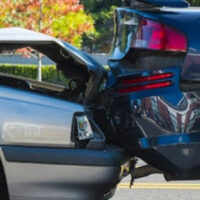Is The Rear Driver Always At Fault For A Rear-End Collision?

A rear-end collision happens when a vehicle crashes into the one in front of it. According to NHTSA, rear-end collisions are the most common type of collision. Rear-end accidents account for an estimated 29% of all accidents. Sadly, rear-end collisions can result in a substantial number of injuries and death every year.
Most individuals assume that the rear driver is always to blame for a rear-end collision. Well, is that true? Indeed, the law does create a presumption that the rear driver is always liable for a rear-end collision. However, this presumption is rebuttable. Simply put, a rebuttable presumption is an assumption made by a court that is considered true unless an individual proves otherwise. Generally, this means that it is always assumed that the rear driver is at fault for a rear-end collision, but the court can be persuaded that someone else should be blamed, in whole or in part, by evidence.
Why Does the Presumption Exist?
Often, rear-end collisions occur because of tailgating, which is the act of following another vehicle too closely. So, because of this, after a rear-end accident occurs, it is usually assumed that a rear driver was following the other too closely and could not stop in time to prevent the accident from happening. Unfortunately, tailgating can result in severe injuries and even death. According to the FLHSMV, in 2019, 350 people in Florida suffered incapacitating injuries, and 8 died in tailgating-related rear-end accidents.
Rebutting the Presumption That the Rear Driver Is Always Liable in a Rear-End Collision
As already hinted, liability for rear-end collisions does not always rest solely on the rear driver. There are instances where the driver in front can be held liable for a rear-end collision. However, it is not common for the driver in front to be held solely responsible for a rear-end collision. Often, drivers share liability for a rear-end collision.
Below are some instances where the driver in front can be held liable (at least partially) for a rear-end collision.
- The car did not have proper working lights: If the vehicle in front had malfunctioning turn or brake lights at the time a rear-end accident occurred, the driver in front might be held liable for the accident.
- The driver made a sudden and illegal stop: If the vehicle a rear driver was following stopped suddenly without adequate warning before a rear-end collision occurred, the driver in front may be held liable.
- The driver was driving recklessly/aggressively: Sometimes, the driver in front will drive aggressively to make the rear driver stop following them too closely. In such a case, if a rear-end collision occurs, the driver in front may be held partially liable for the accident.
Comparative Negligence Rule in Florida
Florida is a comparative negligence state. This means that, even if you are found partially liable for a rear-end collision, you can still recover damages from the other at-fault party. However, in a case where you are partly at fault for a rear-end collision, the amount of compensation you receive will be reduced by your percentage of fault.
Contact a Parkland Car Accident Lawyer Today
If you have suffered injuries in a Florida rear-end collision, our experienced Parkland car accident lawyers at Lyons & Snyder are ready to help you recover the compensation you deserve. We can help you even if you are partly to blame for your accident. Contact us today to schedule a free consultation.
Resource:
